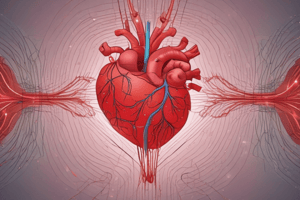Podcast
Questions and Answers
What is the normal heart rate range for a healthy individual?
What is the normal heart rate range for a healthy individual?
- 80 to 100 per minute
- 70 to 90 per minute
- 50 to 70 per minute
- 60 to 80 per minute (correct)
In which region is blood flow maximized according to the content?
In which region is blood flow maximized according to the content?
- Coronary region
- Pulmonary region
- Splanchnic region (correct)
- Cervical region
What is the normal heart rate per minute described in the content?
What is the normal heart rate per minute described in the content?
- 72 (correct)
- 76
- 68
- 80
What term describes arterioles in the context of resistant vessels?
What term describes arterioles in the context of resistant vessels?
What is the maximum heart rate considered for a healthy adult?
What is the maximum heart rate considered for a healthy adult?
What happens to the pressure in a blood vessel when the velocity of blood flow increases?
What happens to the pressure in a blood vessel when the velocity of blood flow increases?
How is resistance affected when the velocity of blood flow increases?
How is resistance affected when the velocity of blood flow increases?
Which relationship is correct concerning pressure, velocity of blood flow, and resistance?
Which relationship is correct concerning pressure, velocity of blood flow, and resistance?
If blood flow velocity is decreased, what is the most likely effect on pressure?
If blood flow velocity is decreased, what is the most likely effect on pressure?
What is the direct relationship between velocity of blood flow and pressure?
What is the direct relationship between velocity of blood flow and pressure?
What is one factor involved in the autoregulation mechanism of coronary blood flow?
What is one factor involved in the autoregulation mechanism of coronary blood flow?
How is coronary blood flow affected by changes in mean arterial pressure within the range of 60 to 150 mm Hg?
How is coronary blood flow affected by changes in mean arterial pressure within the range of 60 to 150 mm Hg?
Which of the following is NOT a factor involved in the autoregulation of coronary blood flow?
Which of the following is NOT a factor involved in the autoregulation of coronary blood flow?
What occurs to coronary blood flow at mean arterial pressure levels above 150 mm Hg?
What occurs to coronary blood flow at mean arterial pressure levels above 150 mm Hg?
Which of the following options best describes the behavior of coronary blood flow as mean arterial pressure decreases below 60 mm Hg?
Which of the following options best describes the behavior of coronary blood flow as mean arterial pressure decreases below 60 mm Hg?
What is the primary location of the sensory area related to heart rate control?
What is the primary location of the sensory area related to heart rate control?
Which part of the brain houses the vasomotor center?
Which part of the brain houses the vasomotor center?
What role does the vasomotor center play in cardiovascular regulation?
What role does the vasomotor center play in cardiovascular regulation?
Which structure is NOT involved in the function of the vasomotor center?
Which structure is NOT involved in the function of the vasomotor center?
What is the main anatomical feature of the vasomotor center concerning heart rate?
What is the main anatomical feature of the vasomotor center concerning heart rate?
Which division of the autonomic nervous system directly affects coronary blood vessels?
Which division of the autonomic nervous system directly affects coronary blood vessels?
What is known about the effect of the autonomic nervous system on coronary blood flow?
What is known about the effect of the autonomic nervous system on coronary blood flow?
Which statement about coronary blood vessel innervation is accurate?
Which statement about coronary blood vessel innervation is accurate?
Why is the effect of the autonomic nervous system on coronary blood flow considered uncertain?
Why is the effect of the autonomic nervous system on coronary blood flow considered uncertain?
What role does the sympathetic division play in coronary blood vessel innervation?
What role does the sympathetic division play in coronary blood vessel innervation?
Flashcards are hidden until you start studying
Study Notes
Vascular Resistance and Blood Flow
- Arterioles, referred to as resistant vessels, play a crucial role in regulating blood flow.
- Maximum resistance occurs in the splanchnic region, highlighting its significance in circulation.
Heart Rate
- Normal heart rate averages 72 beats per minute, with a healthy range between 60 and 80 bpm.
Vasomotor Center
- Located in the medulla and pons, the vasomotor center's sensory area is found in the posterior section, specifically within the nucleus of the tractus solitarius.
Blood Flow Dynamics
- Blood vessel pressure is directly proportional to blood flow velocity; increased velocity results in higher resistance and, consequently, increased pressure.
- Coronary blood flow remains stable within a mean arterial pressure range of 60 to 150 mm Hg, indicating effective autoregulation.
Autoregulation Factors
- Autoregulation of coronary blood flow is influenced by:
- Oxygen demand within tissues,
- Metabolic factors,
- Various physiological stimuli.
Nervous System Influence
- Coronary blood vessels receive innervation from both the parasympathetic and sympathetic divisions of the autonomic nervous system.
- The direct impact of this neural innervation on coronary blood flow remains unclear.
Studying That Suits You
Use AI to generate personalized quizzes and flashcards to suit your learning preferences.




